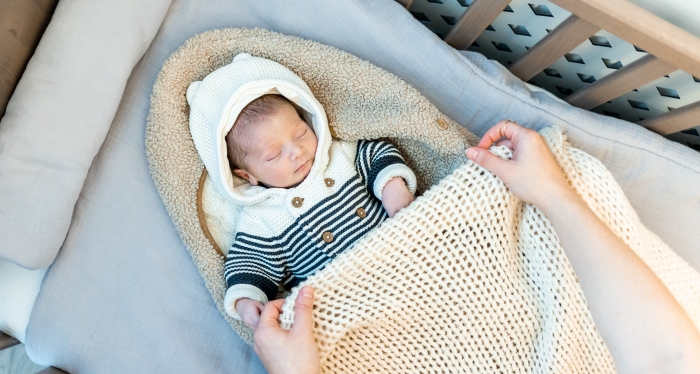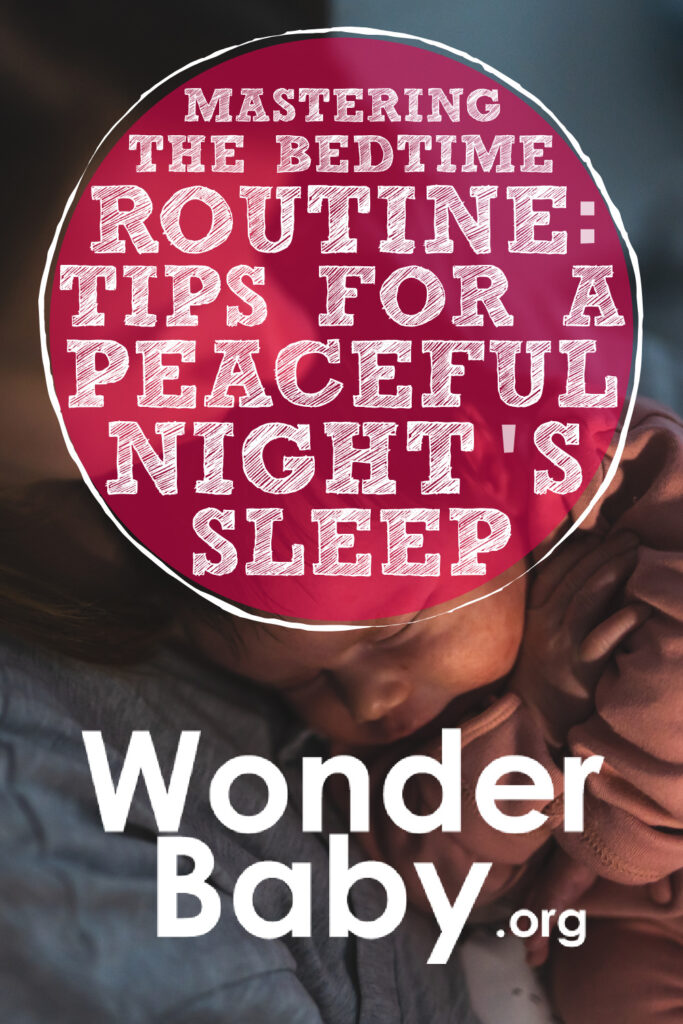Mastering the Bedtime Routine: 3 Tips for a Peaceful Night’s Sleep

- Many new parents struggle to adapt to the exhaustion of new parenthood.
- Babies don’t understand the difference between night and day, so they tend to sleep whenever they like.
- Introducing a bedtime routine may help you to get more sleep.
- A bedtime routine helps your baby learn to expect sleep and that night is for sleep.
Sleep is everything when you have a baby in the house. Remember how much sleep you used to get before you became a parent? You probably took it for granted, not realizing you’d soon invite a sleep thief into your home.
Newborn babies sleep up to 18 hours a day, but new parents get less than five hours each night. Sleep deprivation is really tough, and you may find you’re irritable and emotional as you try to survive on very little sleep.
New parents are often desperate to figure out the secret to getting their baby to sleep through the night. The idea of eight uninterrupted hours of zzz’s is the ultimate new parent fantasy. While there are things you can do to encourage your baby to sleep better at night, unfortunately, there’s no guarantee that your baby will sleep for longer stretches just yet.
Still, a newborn bedtime routine could help your baby fall asleep more easily at night. Babies have no understanding of night and day, so it’s your job to teach them healthy sleep habits, and a consistent bedtime routine is a great place to start.
When to Introduce a Bedtime Routine

There’s no correct answer here. Your baby, your rules. However, it’s probably time to introduce a bedtime routine when you start wondering whether one will help your baby with falling asleep.
Some parents gently introduce a bedtime routine when their baby is around six to eight weeks old. If your newborn isn’t sleeping, you may want to introduce a bedtime routine to encourage them to sleep better at night.
What Time Should I Put My Newborn to Bed?

When it comes to newborn bedtime routines, many new parents aren’t sure when they should put their baby to bed. This is something you need to figure out by observing your baby’s sleep patterns and thinking about what works best for your family.
Newborns get plenty of sleep, though not always at night. They tend to nap a lot during the day and night, so it can be difficult for the parents to feel rested after broken sleep. Once your newborn starts to get the hang of night and day, though, you might find they sleep more at night.
It’s essential to bear in mind, however, that your baby may only sleep for around ten hours at night (not in one stretch, unfortunately), so you need to calculate their bedtime carefully. You don’t want your baby to wake up for the day at 4 am, so try to figure out a reasonable waking time and work backward from there.
It may take some trial and error, but you should be able to establish a bedtime that means you all get enough rest. To maximize your own sleep, it’s important to rest whenever your baby sleeps.
For this reason, many families opt for a later bedtime for their babies so they can head to bed at the same time. Alternatively, some parents switch to a much earlier bedtime for themselves for a few months to ensure everybody gets enough sleep.
Tip #1: Create a Serene Sleeping Environment

Newborn babies aren’t very good at differentiating between night and day, so you should create a serene sleeping environment to help them understand when it’s time to sleep. You want to create a calm environment to lull your baby to sleep. Here are some things to consider:
Lighting
The room needs to be dimly lit to encourage sleep. According to a 2013 article11. McGuire E.. Maternal and infant sleep postpartum. Breastfeeding review : professional publication of the Nursing Mothers’ Association of Australia. 2013;21(2), 38–41. https://pubmed.ncbi.nlm.nih.gov/23957180 published in Breastfeeding Review, “Exposure to light/dark cues appear to assist in the development of the infant’s circadian rhythm.”
Avoid using the big light and use a gentle night light when reading bedtime stories. You don’t want the room to be too dark, or you might stumble (and wake the baby) as you leave the room, so night lights are recommended in rooms where babies sleep.
Comfort
Your baby will need to be comfortable to fall asleep. Ensure they are dressed appropriately for the temperature and have a comfortable mattress. A baby sleep suit is an excellent option for keeping your baby warm and safe at night.
Noise
Avoid loud noises that may distract your baby at bedtime. Some babies are comforted by the use of white noise, which reminds them of the gentle thrum of the maternal heartbeat in the womb. Many products promise white noise that will help your baby sleep through the night, so ask your friends for recommendations before parting with your money.
Safety
To reduce the risk of sudden infant death syndrome (SIDS), it’s essential to put your baby to sleep in a safe sleep environment22. Moon, R. Y.. How to Keep Your Sleeping Baby Safe: AAP Policy Explained. HealthyChildren.org. 2023. https://www.healthychildren.org/English/ages-stages/baby/sleep/Pages/a-parents-guide-to-safe-sleep.aspx. The safest place for your baby to sleep is in a crib or side sleeper in your bedroom for at least the first six months of life. Your baby must be put to sleep on their back. Do not use loose bedding, bumpers, or toys in their crib.
Tip #2: Establish a Bedtime Routine

When it comes to your baby’s bedtime routine, consistency is key. Baby bedtime routines are a great way to teach your baby that it’s time to go to sleep. A consistent baby bedtime routine helps your baby learn what to expect next.
There’s nothing wrong with introducing a baby bedtime routine early. Your bedtime routine isn’t a strict, inflexible schedule; instead, it’s a series of gentle hints to your baby that it’s almost time for sleep. Bedtime routines are designed to teach your baby that sleep is just around the corner.
Each family’s bedtime looks different depending on what works for their family. Your baby’s bedtime routine will likely change significantly over the next few months and years, so don’t forget to be flexible as your baby grows.
Here are some newborn bedtime routine ideas that you may want to include in your baby’s bedtime routine:
Warm Bath
Many families choose to start their bedtime routine with a bath. You know from your own experience how relaxing bathing can be. A calming bath before bed is the perfect way for your baby to unwind before bed. You don’t need to bathe your child every night, but babies often need cleaning more frequently than older kids.
Baby Massage
A short baby massage routine is another fantastic thing to include. Baby massage is a wonderful way to bond with your baby before bed, and it will help soothe your baby and prepare them for sleep.
Changing for Bed
Now that your baby is bathed and massaged, it’s time to prepare them for bed. A fresh diaper and a clean sleep suit will help your baby feel comfortable at night.
Bedtime Stories
It’s never too early to start reading bedtime stories to your baby. The more books you read your baby, the more words they will hear, and the better this will be for their language development skills.
Feeding
Depending on your baby’s age and how you are feeding them, you may want to incorporate a feed into your baby’s bedtime routine. You may want to give your baby a bottle after their bedtime stories. If you’re breastfeeding, you may feed your baby as they fall asleep. There’s nothing wrong with this; you do whatever works best for your family.
Lullabies
Singing lullabies is a tried and tested way to get your baby to sleep. Your baby will feel soothed by the sound of your voice (even if you think you are a terrible singer, your baby loves your voice) and the gentle rhythm of the lullaby.
Tip #3: Manage Night Wakings

As part of teaching your baby the difference between night and day, you need to manage night wakings carefully. Though your instinct may be to turn a bright light on and maybe even the television to help yourself stay awake, you’re better off keeping things calm and dark during night wakings.
Maintain the environment of your baby’s bedtime routine during night wakings to show your baby it’s still night.
Keep the room dark or dimly lit and the atmosphere calm and quiet. Soothe your baby using a gentle voice, and avoid playing with your baby during the night. If you need to change their diaper, try to do it with minimal disruption. For example, using a warmed baby wipe may be less disruptive to your half-asleep baby.
Most babies wake during the night for feeds. Their small tummies require frequent feeds to stay full, so night wakings are to be expected. Learn your baby’s early feeding cues so you can recognize them in the night. Lip smacking, moving their head from side to side, and moving their fist to their mouth are all early clues your baby may need feeding.
Common Sleep Issues

Though newborns are usually pretty good at falling asleep, they may struggle with staying asleep. Their shorter sleep cycles mean babies are prone to more frequent wakings. Once awake, your baby may struggle to fall asleep without your help.
If your baby is struggling to sleep, there could be other causes, such as:
A Gassy Tummy
Your baby may struggle to sleep if their tummy is full of gas. Your baby may cry out in pain if they’re struggling with wind. Always burp your baby after each feed to help them bring up any gas before you lie them down for sleep.
Sleep Regression
Sleep regressions are one of life’s cruelties. Just as you think you have the hang of things and your baby is sleeping better—boom, sleep regression. All of a sudden, your baby is sleeping worse than ever, and you’re so exhausted you want to cry. If your four-month-old struggles to sleep, it could be the four-month sleep regression.
Hungry Baby
Around four months of age, you may notice your baby is too distracted to feed well during the day. This will coincide with an unfortunate increase of feeds at night as your baby tries to catch up on their missed feeds during your sleep time. Seeking out calm, distraction-free places to feed during the day could help restore order and ensure your baby gets enough milk.
When to Seek Professional Help
You should seek professional help for your baby’s sleep if you have any concerns. A pediatrician or certified pediatric sleep consultant will be able to advise you whether your baby’s sleep is normal and whether there’s anything you can do to improve your baby’s sleep. Sometimes, an underlying condition can impact your baby’s sleep, so it’s always worth reaching out to a professional if you are concerned.
References
- McGuire E. (2013). Maternal and infant sleep postpartum. Breastfeeding review : professional publication of the Nursing Mothers’ Association of Australia, 21(2), 38–41. https://pubmed.ncbi.nlm.nih.gov/23957180
- Moon, R. Y. (2023, October 25). How to Keep Your Sleeping Baby Safe: AAP Policy Explained. HealthyChildren.org. https://www.healthychildren.org/English/ages-stages/baby/sleep/Pages/a-parents-guide-to-safe-sleep.aspx

Related Posts

Sleep, Special Needs
Safe Place Bedding Travel Bed Review
Traveling with a special needs child can be stressful! Having a safe, durable, and easy to use travel bed can make traveling so much easier!

Sleep, Special Needs
Sleep Regimen for Premature Babies: Special Considerations
It can take premature babies much longer than their full-term peers to sleep for long stretches. A preemie sleep schedule may encourage better sleep.

Sleep
4 Soothing Techniques for Fussy Sleepers: From Swaddling to White Noise
Is your newborn fussy at night? From gentle bedtime routines to soothing sounds, creating a tranquil environment helps newborn babies sleep peacefully.